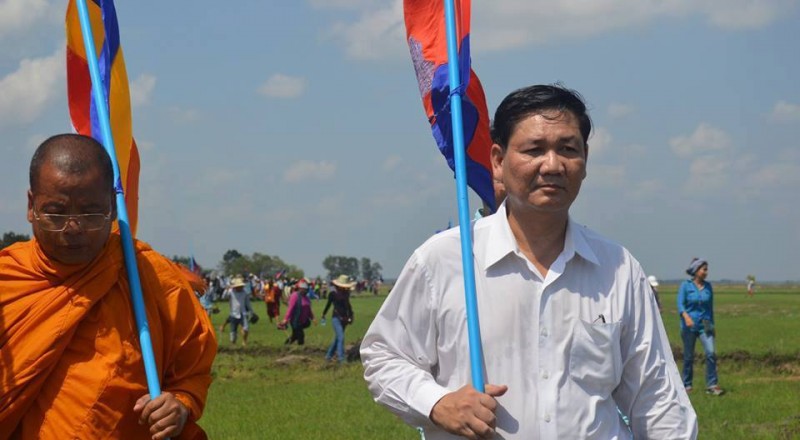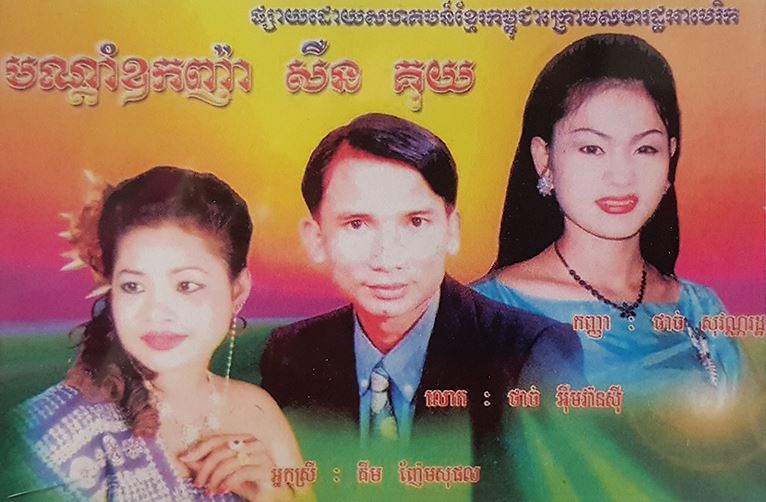Opening Statement by Ambassador William A. Heidt at a Press Availability
សេចក្តីថ្លែងការណ៍របស់លោកឯកអគុ្គរដ្ឋទូត William A. Heidt ជាមួយអ្នកសារព័ត៌មាន
Tue 7th Waning Moon of Poṭṭhapāda B.E.2561, September 12, A.D.2017 Year of the Rooster
U.S. Embassy, Phnom Penh, September 12, 2017
Download Khmer PDF: William A. Heidt Statement
Thank you all for coming out today. I would like to make a brief statement, and then take questions.
On September 2, I departed for the United States for an unplanned personal trip. Forty minutes after I departed, the Government arrested the opposition leader, Mr. Kem Sokha, on treason charges related to comments he apparently made four years ago.
To be honest, I wasn’t totally surprised when I learned this unfortunate news. But I was surprised by the allegations against the United States in connection with Mr. Sohka’s arrest, made without a shred of serious or credible evidence.
These are extraordinary allegations. The business of diplomacy is normally carried out with careful and respectful language, the kind of language I’m going to use today. Difficult messages are delivered privately first. Friendly nations seek ways to bridge differences.
But on dozens of occasions over the past year, the United States has been subject to intentionally inaccurate, misleading and baseless accusations.
This has been very painful for me personally. I think you know that I have a special connection to Cambodia, and I came here two years ago with clear instructions to seek to improve our relationship. And indeed, I and my staff have sought, over and over again, to treat everyone with respect, to keep our public statements minimal and fair, and to look for ways to cooperate and build bridges between our two great peoples.
I invited members of the press here today to make just three points. The first one is very simple: All of the accusations you have heard in recent weeks about the United States – every one of them – are false. The recent press stories about Mr. Sokha’s arrest have completely, and intentionally, mischaracterized what the United States is doing in Cambodia. They are classic red herrings.
So let me tell you what we have been doing. I won’t read the whole list below, but the truth is, our programs have been remarkably consistent since our Embassy reopened in 1994:
- We have been a powerful supporter of Cambodia’s economic development. We helped Cambodia create a labor framework that attracted the biggest names in the global garment business, including dozens of American brands. This past year, we created an entirely new, $100 million travel goods industry that today employs nearly 100,000 workers.
- Just this year we launched a new agriculture program that will help address the cripplingly low prices that are hurting Cambodian farmers. We have helped Cambodia tackle low agricultural productivity and food insecurity for more than 20 years.
- We have made major strides in improving public health in Cambodia. With American assistance, Cambodia is very close to being the first country on earth to approach 0% transmission of HIV/AIDS. We are leading research to cure drug-resistant malaria.
- We have educated thousands of Cambodians through exchange programs and other assistance. We have built remarkably close people-to-people ties that have benefitted both countries and fostered reconciliation in Cambodia. We have empowered thousands of women and helped teach disadvantaged children English.
- We have been a powerful force for justice. We have arrested criminals that have made both our countries safer, and we have worked shoulder-to-shoulder with the government and civil society to reduce trafficking in persons.
- We have celebrated and preserved Cambodian culture. The American people have funded the preservation of some of Cambodia’s most cherished national treasures, including Phnom Bakheng and Prasat Han Chey.
- And yes, we have helped strengthen Cambodia’s democracy. Some government officials have criticized this part of our program recently, but we are proud of our work to improve governance and help leaders respond to their constituents. We have assisted the National Election Committee and trained Cambodia’s political parties – including the CPP – on how to better communicate their programs to the voters.
History has played a part in many of these recent allegations, and we acknowledge our Vietnam War era legacy in Cambodia. But we also have been committed to addressing that legacy. Do you know that we have provided over $160 million to clear the country of unexploded ordnance? Half of that money has gone to clearing ordnance dropped by U.S. planes in the eastern part of the country. But the other half has gone to clearing Chinese, Soviet, and Vietnamese mines in the west – minefields that are ten times more deadly.
Over the next couple weeks, we will be giving the real story about our activities, and how they have been good for both our countries. Please watch our Facebook page and give us your comments.
My second point is equally simple. As much talk as there is about America these days, the events of the past month aren’t hurting the United States, they are hurting Cambodia. They are, step by step, isolating Cambodia from the international community at the very moment Cambodia needs international support to raise its economy to the next level and compete with its neighbors in ASEAN.
The anti-American rhetoric has made many Americans and other western tourists feel less welcome today in Cambodia. This year, they may spend their money in Halong Bay or Phuket instead of Angkor Wat.
American and western companies also feel less welcome today, and many fewer will invest in Cambodia. You may have seen the U.S.-ASEAN Business Council statement in this regard.
And American philanthropies – the biggest and richest in the world – also feel less welcome in Cambodia. I estimate that American charities have built more than 1,000 schools in Cambodia. That’s remarkable, isn’t it? I have heard from some of the biggest charities, however, that Cambodia is becoming too risky to operate, and they are thinking of shifting their good work to Indonesia, or Bangladesh, or Vietnam.
But the most serious impact is on Cambodia’s reputation as an emerging democracy. Just three months ago, Cambodia held its freest and fairest elections since 1993. The Cambodian people were rightfully proud, and the United States rightfully congratulated the government and the Cambodian people.
Now fast forward three months. The truth is, if Cambodia’s national elections were held today, no credible international observer would certify them as free, fair, and reflecting the will of the Cambodian people.
I hope everyone will think carefully about this point. There is something special about being a democracy. In a democracy, ordinary people have a real stake in their country, and the relationship between the government and the people is deeper. Other countries look at you differently too, with more respect and understanding. It’s something worth struggling for.
And now my final point: Despite all the events of the past month, I believe there is still time to salvage Cambodia’s 2018 elections, continue Cambodia’s democratic development, and restore our bilateral relationship. But it will take firm and urgent actions.
We join the European Union in calling for Mr. Kem Sokha’s immediate release. The normal functioning of Cambodia’s media market should be restored. Pressure on civil society should cease. And, perhaps most importantly, the government, opposition, and civil society should begin a dialogue about the future of Cambodia’s democracy in an open, respectful, and pressure-free environment.
I want to conclude on a personal note. Since we arrived two years ago, my wife, son and I have been honored by the incredibly warm welcome we have received from everyday Cambodians, especially over the past month. And I have been very proud of the hard work and commitment of the American and Cambodian employees of the embassy, and of the broader American community.
The truth is, America is not a complicated country to work with. Treat us fairly, speak to us honestly, cooperate where we can, use the power of our markets to your advantage, welcome our assistance programs and companies.
My hope is that the Cambodian government will show us the same goodwill that we show them, so that we can resume what was, until a year ago, a very powerful, very special partnership.
Thank you very much.
Related
សូមគាំទ្រឧបត្ថម្ភ សហគមន៍ខ្មែរក្រោម Support KKC
សូមអរគុណដ៏ជ្រាលជ្រៅចំពោះសប្បុរសជននូវវិភាគទានទាំងនេះ។
We’re On Facebook

Sign in
Click here to reload the page over ssl.





